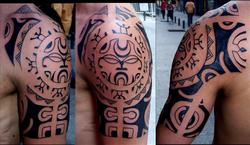In Habana: Tattoo
- Submitted by: admin
- Travel and Tourism
- Arts and Culture
- Caribbean
- culture an traditions
- Destinations
- Education
- history
- international
- personalities
- Society
- Theater
- 02 / 06 / 2009

Cuban filmmaker and theatre director Enrique Alvarez seems determined to erase the borders between cinema and theatre. Perhaps that’s the starting point of his decision to produce Tattoo, a theatre piece from German writers Igor Bauersima and Réjane Desvignes, which I find perfect for the script of a movie.
Tattoo tells the story of Tiger, a successful man and a plastic artist with tattoos all over his body, who commits his friend Lea to take care of his body in case he dies. Such agreement will bring about strange reactions by the ones involved in it and it will have an influence on their lives.
Playing at the Tito Junco hall of the Bertolt Brecht Cultural Centre, the first thing that drew my attention about Tattoo was the spatial location of the players, standing on each end of the stage, with their backs to the audience, absorbed in their own particular worlds. She is an actress who announces musical programs on the radio. He is writing an endless novel. Tiger’s arrival breaks away with monotony and boredom, and it forces them to interact with each other and question their ideals about art and life itself.
Questions multiply: What is art? What’s its real value today? What’s its impact on society? Who are artists? What’s the difference between an artist and the rest of the people? Those are perfect questions to break away from the idyllic image of artists that we see in real-life magazines.
In order to underline the individuality of the characters and the conflicts between them – Lea and Fred have a fight over a part in a bad movie she turned down, and there is no money to pay the rent until he finishes his novel. Naomi and Tiger also argue because they think they are being used by each other – the director does not require great scenographic displays or spectacular changes of costumes.
By using very suggestive film representations and taking advantage of the few pieces of furniture on the stage, Alvarez builds up high-impact images. And that is, in my opinion, the most admirable aspect of this production: the director’s ability to create a score where theatre, cinema, literature and plastic arts come together as one. It seems like if all the director’s obsessions find their right way on the stage.
I think the play’s weak point is on its unbalanced acting, since it’s no easy to play a text where events take place without great consternations, where emphasis is not the main feature. And that leads to some kind of strangeness among the audience, who is used to communicating with artistic representations through the emotional way. In any case, it’s worth mentioning the performances by Ismercy Salomón and Léster Martínez, two young actors whose careers are on a fast and continuous rise.
With the production of Tattoo, Enrique Alvarez´s approach – I’m not sure whether I should call him a filmmaker or a theatre director - brings an aura of beauty and intelligence to contemporary Cuban theatre.
(Cubarte)
Comments